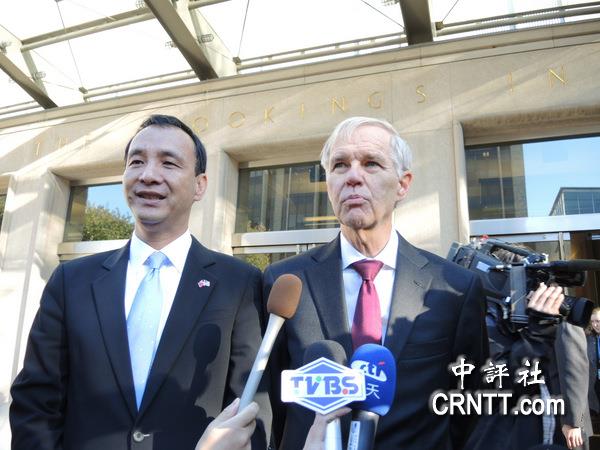
|
| 朱立倫在美國智庫布魯金斯研究院演說,指民進黨不可能和大陸展開新的一頁。(中評社 黃筱筠攝) |
中評社華盛頓11月13日電(記者 黃筱筠)中國國民黨主席、“總統”參選人朱立倫上午約9點5分抵達華府重要智庫布鲁金斯研究院,隨即在東亞研究中心主任卜睿哲陪同下進行演說,朱立倫用英文演講,幾乎照稿演說,並未脫稿。朱立倫強調,海峽兩岸能維持現狀主要是馬英九的成就,他是國民黨“總統”參選人當然會持續維持現狀,相對蔡英文的維持現狀,難道代表殊途同歸?難不成民進黨終於打算與中國大陸開展全新的一頁?他的答案是,幾乎不可能。
朱立倫也強調,國民黨與民進黨最大不同在於,民進黨總是以一廂情願的態度面對兩岸關係。民進黨提出政策目標“維持現狀”,很容易得到人民掌聲,但問題是民進黨老是避談可行方案。朱立倫在演講時親切稱呼與會人士“我的好朋友”。
以下為演講中英全文:
今天,不但是布鲁金斯研究院的學術養分吸引我來此,也是我本人、本黨(國民黨)、反對黨 (民進黨),以及所有台灣人民數十年與貴院建立的友誼把我帶來這裡。我們對美國支持台灣的民主表達誠摯感謝。
各位是研究中國外交政策與台海關係的翹楚,清楚了解台灣海峽的和平與穩定符合台灣、中國大陸、與美國三邊的利益。其中任何一方的誤判,將可能嚴重損害美中台三邊脆弱的利益平衡。
因此,六月三日民進黨黨主席蔡英文於美國智庫戰略與國際研究中心(CSIS)演講中,談到她 “已表達並多次重申對維持現狀的立場” ,同時,她 “將在“中華民國”現行憲政體制下,依循普遍民意,持續推動兩岸關係的和平穩定發展。” 然而 海峽兩岸之所以能 “維持現狀”,是馬英九的成就。我作為國民黨的“總統”候選人,一定會持續維持現狀。所以,這代表殊途同歸? 畢竟,台灣過去兩年來經歷許多挑戰(例如太陽花運動,與民進黨在“立院”無數次地阻撓議事)。難不成民進黨終於打算與中國大陸開展全新的一頁? 我的答案是:“幾乎不可能”。
民進黨在處理兩岸事務與國民黨最大的不同在於,民進黨總是以一廂情願的態度面對兩岸關係。民進黨提出政策目標“維持現狀”,很容易得到人民掌聲,但問題是民進黨老是避談可行方案。國民黨對待兩岸關係則採務實政策,你必須考量對手對你的態度,你要制定怎樣的政策架構,你應該要釋出或期待接受什麼樣的訊息,最後,如何在這樣棘手處境中,與一個崛起中的大國交手。馬英九設計了一個機制以維持現狀,這點做得非常好。但兩岸關係錯綜複雜,經緯萬端,好的政策也會有意想不到的結果。如果我有幸當上“總統”,我將更進一步補足現行政策,我要培養“國內”的政治基礎,用以支持這個“國家”大戰略,以確保海峽兩岸的和平與穩定。
在與在座學者交換意見前,容我提出我的兩岸政策輪廓:
台灣需要持續現行的政策架構,與中國大陸繼續和解,才能夠維持現狀。台灣必須加強對中國大陸的了解,在每次接觸中,評估中國大陸對台灣的意圖。與美國密切合作,但台灣必須避免讓美國陷入不必要的台海紛爭中。台灣人民必須成為負責任的利害攸關者, 必須負責地、嚴肅地思考“國家安全”問題。台灣必須更加開放其貿易體制,使企業在大陸、在國際市場更具競爭力。
為了達到上述目標,制度性改革是必要的。
我先講到這裡,等會兒將和各位學者專家繼續深度交換意見。謝謝大家。
It gives me great pleasure to be in this institution, a bulwark in American democracy that knows the science of public policies and the art of speaking truth to power. And it is not just the academic appeal of the Brookings Institution that brings me here, it is also the friendship I, my party the KMT, the opposition party DPP, and, indeed, all Taiwan people have enjoyed for decades that led me here. We are thankful of American’s support for Taiwan’s democracy.
As top experts in Chinese foreign policy and cross-strait relations, you can see that peace and stability in the Taiwan Strait is in the national interests of Taiwan, Mainland China, and the United States. Any misstep by any party in the triangular relationship can seriously damage the delicate balance of interests across the Taiwan Strait.
Therefore, on June 3, DPP Chairwoman Tsai revealed in a speech at the Center for Strategic and International Studies that she has “articulated and reiterated [her] position of maintaining the status quo”…and that she “will push for the peaceful and stable development of cross-strait relations in accordance with the will of the Taiwanese people and the existing ROC constitutional order.” The “status quo” in the Taiwan Strait, however, is a major achievement of President Ma. And as the presidential candidate of the KMT, I most certainly will maintain the status quo. So, does this mean that “the more things change, the more they stay the same?” After all, Taiwan has undergone many difficulties (e.g., the Sunflower Student Movement, and the DPP’s numerous obstructions of the legislative deliberation process) over the past two years. Has the DPP finally turned a new page in its dealing with Mainland China? My answer is “Hardly.”
There is a major difference between the DPP’s treatment of cross-strait relations and the KMT’s. The DPP engages in wishful thinking vis-à-vis cross-strait relations. The DPP offers a policy goal, i.e., maintaining the status quo, which people agree upon, but the DPP shirks the responsibility of providing a workable formula to achieve that goal. The KMT treats cross-strait relations as a “substantive policy”, that is, you need to gauge how other parties think of you, what kind of policy framework you should lay down, what signals you should send and expect to receive, and, ultimately, how you walk the tightrope in dealing with a rising great power. President Ma has done an excellent job in designing an architecture that created and helps maintain the current status quo. But he did neglect one aspect about the complicated and complex nature of cross-strait relations. If elected president, I will make up for what he left out—cultivating a domestic base for a grand strategy that can secure peace and stability in the Taiwan Strait.
Before I start discussions with the distinguished scholars present here, let me draw a rough outline of my cross-strait policy:
Taiwan needs to continue its current policy framework to pursue rapprochement with China so as to make the status quo work;
Taiwan must strengthen its understanding of China and incorporate a realistic assessment of China’s intentions toward Taiwan in every round of encounters;
While working closely with the United States, Taiwan must not entrap the United States in any unnecessary entanglements in the Taiwan Strait;
For Taiwan to be a responsible stakeholder, Taiwan people must think responsibly and seriously about its national security;
Taiwan must further liberalize its trade regime to make its businesses more competitive in the world market. And,
To achieve the above, institutional reforms will be needed.
That is the end of my remarks for now. Thank you. |